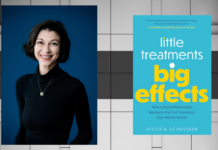Psychotherapy and Social Change: Mick Cooper on Counseling, Pluralism, and Progressive Politics
Javier Rizo interviews Mick Cooper on the intersection of psychotherapy and social transformation, the pluralistic approach to counseling, and the role of psychology in building a more just society.
“All Real Living Is Meeting”: Brent Robbins on Love, Death, and the Possibilities of...
Psychologist and existential thinker Brent Robbins reflects on a lifetime of work, the limits of psychiatric diagnosis, and what facing mortality has taught him about joy and human connection.
Kids Are Not the Problem: An Interview With Gretchen LeFever Watson
In this interview, Brooke Siem, who is the author of a memoir on antidepressant withdrawal, May Cause Side Effects, interviews Gretchen LeFever Watson, PhD.
Gretchen...
Peer Support and Resistance: Becky Brasfield’s Vision for Mental Health Justice
In this interview with Ayurdhi Dhar, Becky Brasfield calls for radical truth-telling in the mental health system.
Summing up the STAR*D Scandal: The Public was Betrayed, Millions were Harmed, and the...
American psychiatry, the NIMH, the larger medical community, and mainstream media have betrayed the American public by failing to make this scandal known.
Mad Sisters: An Interview With Susan Grundy
Susan Grundy on her lifelong caregiving journey for an older sister diagnosed with schizophrenia at the age of 13.
The Anatomy of Anxiety: An Interview With Ellen Vora
Dr. Ellen Vora, author of 'The Anatomy of Anxiety', joins us to discuss trauma, grief, functional medicine and more.
One Person’s Journey from Celebrity Medical Model Advocate to Skeptic: An Interview with Rose...
Rose Cartwright is a screenwriter and the author of Pure, a hugely successful memoir which was then turned into a series for Channel Four....
We Should Listen to Our Emotional Pain: An interview with Paul Andrews
Dr. Paul Andrews is an Associate Professor of Evolutionary Psychology in the Department of Psychology, Neuroscience and Behaviour at McMaster University. His research focuses...
Why Does a Parent Medicate a Child? An Interview with My Mother
When Brooke Siem was 15 years old, her father died. Her mother, Dee Barbash, sought help for her daughter that led to a prescription for a psychiatric drug. In this interview, they look back on that fateful decision.
From Freud to Fanon: How Daniel Gaztambide is Redefining Psychoanalytic Practice
In this interview, Daniel Gaztambide discusses how decolonial perspectives can transform psychoanalytic practice.
Faith Healing in India: An Ancient Way of Tending to Madness
In contrast to the colonial legacy of medical psychiatry in India, indigenous and faith healing methods emphasize the interconnectedness of the mind, body, and spirit, using rituals, storytelling, and communal support to create a holistic healing environment.
MindFreedom’s Shield Program: Working to Free People from Psychiatric Incarceration and Forced Treatment
“We need the MindFreedom Shield to have someone in our corner when we are told that it doesn't matter what we want, that someone else can make a choice about our bodies that we will have to live with for the rest of our lives.”
The Path from Trauma to The Power of Nature: An Interview with Banning Lyon
Our guest today is Banning Lyon, author of The Chair and The Valley: A Memoir of Trauma, Healing, and The Outdoors. An account of...
Multiplicity and Mad Studies: An Interview with Jazmine Russell
In this interview, Jazmine Russell describes her journey through psychosis and mental health advocacy to embracing a multiplicity of frameworks in Mad Studies.
The Maudsley Deprescribing Guidelines: An Interview with David Taylor and Mark Horowitz
Tapering should be tailored and adjusted to the patient, slowed and more hyperbolic in people who have severe and longstanding reactions.
A Win for Science, with Profound Implications for Industry: FDA Rejects MDMA
Concerns, from functional unblinding to sexual assault in the clinical trials, led this week to a full repudiation of Lykos' MDMA-assisted therapy.
Our Medical System Protects Wrongdoers and Punishes Whistleblowers: An Interview with Carl Elliott
MIA’s Ayurdhi Dhar interviews Carl Elliott about scandals in psychiatry and the challenges faced by whistleblowers.
The Clinical, Social, and Cultural Harm of an Iatrogenic Psychiatry
Normal reactions transformed into illnesses, emotions stripped of meaning, & people deprived of their autonomous coping skills and supports.
The Dying of the Light: Norway’s “Medication-Free” Services for Psychotic Patients Are Fading Away
Despite their successful outcomes, Norwegian non-coercive and medication-free programs are being threatened with closure.
Dismissing the “Human Experience”: College Students Feel Unseen by the Medical Model of Mental...
In conversations with college students and recent graduates from across the country and around the world, they described feeling dismissed by views of mental health that narrow their experiences to individual medical problems.
Beyond Paternalism or Abandonment in Mental Health Care: An Interview with Neil Gong
Neil Gong exposes the false choice in mental health policy between tolerant containment for the poor and paternalistic surveillance for the rich.
The Connection Cure: An Interview with Julia Hotz
Julia Hotz is a solutions-focused journalist based in New York City. She is the author of the forthcoming book, The Connection Cure: The Prescriptive...
Lessons from a Global Psychiatric Conference: The Good, the Bad, and the Complicated
Has the global mental health movement truly reformed its tone-deaf universalist attitudes?
Conveying Hope, Empowering Teens: An Interview With Jessica Schleider
Clinical psychologist Jessica Schleider is founding director of the Lab for Scalable Mental Health, researching single-session interventions.

































